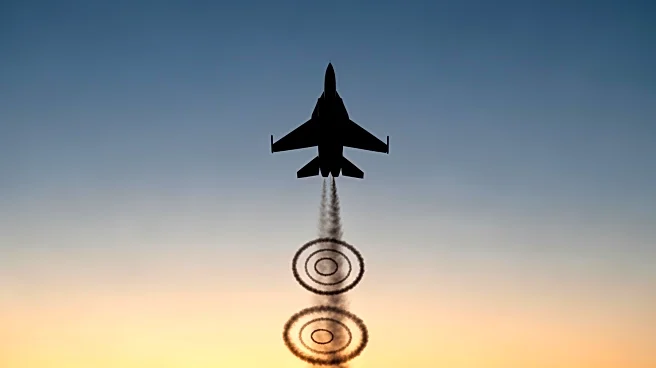What's Happening?
Wing Commander Namansh Syal of the Indian Air Force was killed when a Tejas fighter jet crashed during a demonstration at the Dubai Air Show. The Russian Knights aerobatics team paid tribute to Syal by performing the 'Missing Man' maneuver, a symbolic
aerial salute to fallen pilots. The crash occurred during a low-altitude negative G turn, resulting in the aircraft nosediving into the ground and creating a plume of smoke and fire. The incident marked the second crash involving the Tejas aircraft in less than two years. Syal was cremated with full military honors in his ancestral village in Himachal Pradesh, India.
Why It's Important?
The crash of the Tejas fighter jet at a major international air show highlights concerns about the safety and reliability of the indigenous aircraft, which is a key component of India's defense strategy. The incident may impact India's defense exports and its reputation in the global aviation industry. The tribute by the Russian Knights underscores international solidarity among military aviators and the shared risks they face. The crash also serves as a reminder of the inherent dangers in aviation demonstrations, which are often used to showcase technological advancements and military prowess.
What's Next?
The Indian Air Force may conduct a thorough investigation into the crash to determine its cause and prevent future incidents. This could lead to modifications or improvements in the Tejas aircraft design and operational protocols. The incident may also prompt discussions within India's defense sector regarding the continued development and deployment of indigenous military technology. International stakeholders, including potential buyers of the Tejas jet, will likely monitor the situation closely to assess the aircraft's safety and performance.
Beyond the Headlines
The crash raises questions about the balance between showcasing military capabilities and ensuring pilot safety during high-risk maneuvers. It also highlights the emotional and psychological impact on the families and colleagues of fallen pilots, as well as the broader military community. The tribute by the Russian Knights reflects the deep camaraderie and respect among aviators worldwide, transcending national boundaries and political differences.















